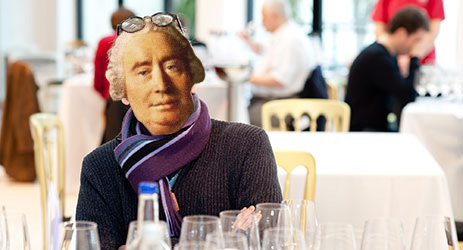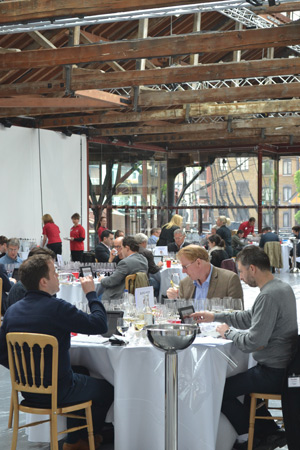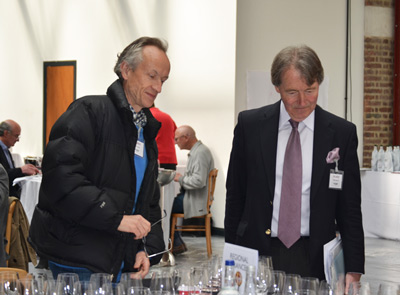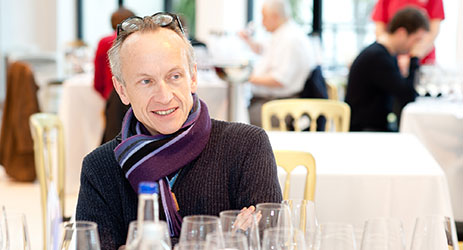Jefford on Monday
Winegrowing is not artistic composition: a true work of art (poem, novel, symphony) is entirely created by the single fashioning mind. Without that mind, the work would not exist. What M. Guigal and Mr Gago do is craft: skilfully growing and then transforming an agricultural crop. Someone else could do the job, with less skill.

Can we wine drinkers, though, appreciate wine in a similar manner to the way in which we savour novels or symphonies? I think we can, even if winemaker and terroir must be regarded as co-authors or co-composers of the work in question. I turned over the question on my way home after five days spent at London’s Tobacco Dock, judging this year’s Decanter World Wine Awards. David Hume in hand.
A professorial friend in Hume’s home city of Edinburgh had, a while back, suggested I take a look at David Hume’s 1757 essay ‘Of the Standard of Taste’, a key contribution to aesthetics from the Scottish Enlightenment (and freely available on the web). What I discovered was astonishing.

Tobacco Dock, London © Decanter
Improbable as it may seem, the long-dead philosopher had, in fact, secretly concealed instructions for our modest tasting competition over 250 years earlier, all the while pretending that he was writing about men in wigs reading Homer or Milton.
Tasting conditions, first of all: they need to be calm, airy, spacious and quiet. “[W]e must choose with care a proper time and place, and bring the fancy to a suitable situation and disposition. A perfect serenity of mind, a recollection of thought, a due attention to the object; if any of these circumstances be wanting, our experiment will be fallacious, and we shall be unable to judge of the catholic and universal beauty.” Hume would have approved of Tobacco Dock.
DWWA tasters, Hume went on to specify, should be acute, possessing “the perfection of every sense or faculty, to perceive with exactness its most minute objects, and allow nothing to escape its notice or observation.” Even at the end of the afternoon, we need to keep our concentration up.
“A good palate”, he continues, “is not tried by strong flavours, but by a mixture of small ingredients, where we are still sensible of each part, notwithstanding its minuteness and its confusion with the rest.” Difficult with rosé, but we did our best.
Experience, of course, counts in helping us do this: “though there be naturally a wide difference in point of delicacy between one person and another, nothing tends further to increase and improve this talent, than practice in a particular art, and the frequent survey or contemplation of a particular species of beauty.” Frequent? Daily, even.
Naturally, we need to take our time over each wine: “[t]here is a flutter or hurry of thought which attends the first perusal of any piece, and which confounds the genuine sentiment of beauty.” It’s important, as we assess, to judge each wine in its own cultural context, and against its peers – so as to “avoid rashly condemn[ing] what seemed admirable in the eyes of those for whom alone the discourse (or the wine) was calculated.” We are, indeed, no more than surrogate drinkers.

2014 DWWA judging week © Decanter
There is no reason why inexpensive wines shouldn’t win gold medals, Hume implies: “[e]very work of art” (or bottle of wine) “has also a certain end or purpose for which is is calculated; and is to be deemed more or less perfect, as it is more or less fitted to this end.”
Naturally, specious charms (oak and artifice) are to be spurned: “there is a species of beauty, which, as it is florid and superficial, pleases at first; but being found incompatible with a just expression either of reason or passion, soon palls upon the taste, and then is rejected with disdain, at least rated at a much lower value.” We should resist any temptation to commend inadequate wines: “[a] great inferiority of beauty gives pain to a person conversant in the highest excellence of the kind, and is for that reason pronounced a deformity.”
By contrast, the wine-loving Scottish thinker foresaw the need for gold, silver and bronze medals in addition to commendations, and perhaps even for the 100-point scale itself: “[i]t is impossible to continue in the practice of contemplating any order of beauty, without being frequently obliged to form comparisons between the several species and degrees of excellence, and estimating their proportion to each other.” Mr Parker stands vindicated.
Hume even seemed to anticipate the two main wine-judging styles: Australian “(a strong sensibility to blemishes, and is extremely studious of correctness)” and European “(a more lively feeling of beauties, and pardons twenty absurdities or defects for one elevated or pathetic stroke)”. He also foresaw the need for panel chairs, for Guest Vice-Chair Gerard Basset, and for Chairman Steven Spurrier. “It is plainly an error in a critic, to confine his approbation to one species or style of writing, and condemn all the rest. But it is almost impossible not to feel a predilection for that which suits our particular turn and disposition.” Hence split panels; hence the need, from time to time, for resolution from above.
Despite all the difficulties, Hume (from his distant vantage point) could see that our medal-hunting at the DWWA was worthwhile: “[i]f ... there be an entire or considerable uniformity of sentiment among men, we may thence derive an idea of the perfect beauty.” I fancy he might well have enjoyed judging it with us. What a shame he’s no longer around.

Columnist Introduction
Andrew Jefford is a columnist for both Decanter magazine and www.decanter.com, Jefford has been writing and broadcasting about wine (as well as food, whisky, travel and perfume) since the 1980s, winning many awards – the latest for his work as a columnist. After 15 months as a senior research fellow at Adelaide University between 2009 and 2010, Andrew is currently writing a book on Australia's wine landscape and terroirs. He lives in the Languedoc, on the frontier between the Grès de Montpellier and Pic St Loup zones.
Click here to read all articles by Andrew Jefford>>
- Follow us on Weibo@Decanter醇鉴 and Facebook
and Facebook for the latest news and updates -
for the latest news and updates -
All rights reserved by Future plc. No part of this publication may be reproduced, distributed or transmitted in any form or by any means without the prior written permission of Decanter.
Only Official Media Partners (see About us) of DecanterChina.com may republish part of the content from the site without prior permission under strict Terms & Conditions. Contact china@decanter.com to learn about how to become an Official Media Partner of DecanterChina.com.


Comments
Submit